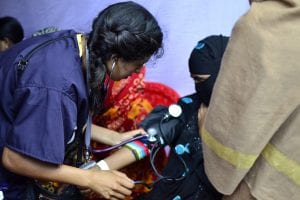Empowering women in Bangladesh: My time volunteering with the Maternal Aid Association
By By Guest Blogger, on 28 January 2019
Yasmin is a fifth year Medical student at UCL. Here, she blogs about her time spent volunteering for the charity Maternal Aid Association (Maa) in Bangladesh.
Empower (/em-pow-er/) verb
Make (someone) stronger and more confident, especially in controlling their life and claiming their rights.
 Women globally experience inequalities in all areas of society, from the workplace to healthcare.
Women globally experience inequalities in all areas of society, from the workplace to healthcare.
Growing up in an all-female home, my mum instilled in me the importance of feeling positive about yourself, but also of being a force of positivity for those around you, especially women who have not had the same opportunities.
Guided by this driving force, in August 2018, I worked with the charity ‘Maternal Aid Association’ (Maa), leading their flagship project in Bangladesh, JourneyMaa.
Maa has a simple aim: to revolutionise maternal healthcare in resource-poor settings across the developing world.
Maternal health camps
JourneyMaa is a stepping-stone towards this goal and provides free maternal health camps and education to hundreds of pregnant women living in rural Bangladesh, by establishing a unique collaboration between volunteers from the UK and healthcare professionals from Bangladesh.
The maternal health camps involved conducting basic health checks, which are vital in preventing and detecting complications during pregnancy. These included blood pressure, urine dipstick and blood glucose measurements to screen for conditions such as gestational diabetes and pre-eclampsia, some of the leading causes of maternal mortality in Bangladesh.
Emotional strength
From speaking to pregnant women, I was struck by how common it was for women to miscarry and experience neonatal deaths in Bangladesh.
The emotional strength it must take to overcome such a tragedy is unimaginable. What makes this even more shocking is that with better maternal healthcare, many losses could have been prevented.
In addition to health camps for pregnant women, we provided educational seminars for young girls to tackle the deep-rooted stigma surrounding the topic of menstruation. In many cultures, including Bengali culture, women are generally considered ‘unclean’ during menstruation. 
Due to these beliefs, there are various restrictions placed on menstruating women, as well as unsafe sanitary practices that occur.
For example, menstrual rags are used repeatedly and often improperly washed without soap and dried in damp conditions, which can fester with bacteria and insects. This poses a potentially life-threatening infection risk to girls.
Combatting stigma
To address this, we delivered educational talks and created an open space for discussion about periods to combat stigma and help the girls understand how to maintain good menstrual health. It was inspiring to hear the thoughts of the girls both before and after the seminars as it highlighted how their confidence had improved when speaking about what is traditionally a taboo topic.
Pre-seminar, they were apprehensive and shy when asked about their experience with periods. However, post-seminar, the confident manner in which they were discussing menstrual hygiene was fantastic – I was moved by their enthusiasm for learning and progression.
Bottom-up approach
I believe female empowerment through education is a strong tool to make long-lasting and widespread change. Educating women and girls has positive ripple effects in society, particularly through bottom up approaches. A bottom-up approach refers to the idea that individual actions can have a huge impact when adopted by many.
The girls we spoke to were keen on spreading their knowledge to their mothers and aunts, which meant the knowledge they acquired would span across multiple generations. These girls are the ambassadors of charge that is so desperately needed.
Educating a girl is a critical investment into their future, as well as the future of their country. As stated in a UNICEF report: “When you educate a girl, you educate a whole nation”.
Working with Maa has been incredible, and I am thrilled to be working again in Bangladesh this summer as the project manager of JourneyMaa 2019. With passionate individuals at its forefront, Maa is on its way to revolutionise global maternal healthcare, one step at a time.
 Close
Close

